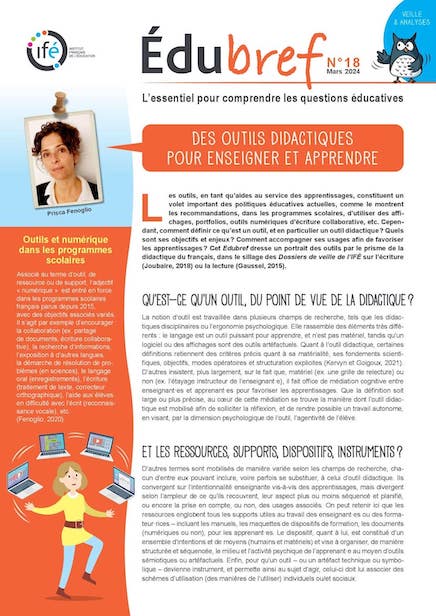Pays : France
Langue(s) : français
Auteur(s) : ARSLAN Salahattin
Date de soutenance : 2005
Thèse délivrée par : Université Joseph Fourier
Section(s) CNU : section 26 : Mathématiques appliquées et applications des mathématiques
Discipline(s) : Didactique des mathématiques
Sous la direction de : Hamid CHAACHOUA & Nicolas BALACHEFF
Jury de thèse : Michèle ARTIGUE, Paris VII - Nicolas BALACHEFF, CNRS - Abdelhamid CHAACHOUA
Le champ des équations différentielles joue un rôle éminent pour les mathématiques et pour d’autres disciplines. Historiquement, il a d’abord été dominé par la résolution algébrique, deux autres approches ont cependant surgi par la suite : qualitative et numérique. Néanmoins l’analyse de l’enseignement montre que celui-ci est dominé par l’approche algébrique. Le contenu tel qu’il est, reflète médiocrement l’importance de cet objet de savoir. En outre, plusieurs recherches ont décelé une faiblesse de motivation chez les étudiants. De ce fait depuis une vingtaine d’années un certain nombre de travaux essayant d’intégrer d’autres approches au niveau universitaire ont émergé. Encouragé en particulier par les programmes secondaires français, nous nous interrogeons dans cette thèse sur la viabilité de l’approche qualitative en classe de Terminale S. Pour ce faire nous avons élaboré une ingénierie didactique, tout en recourant à la notion de registre sémiotique et à celle de conception suivant le modèle ck¢ (Balacheff). L’étude est composée de quatre parties : dans la partie A, après une étude historique, nous présentons les trois approches et explicitons les raisons pour lesquelles nous favorisons l’approche qualitative. Nous rappelons ensuite les contraintes qui s’opposent à son intégration afin de remédier à certaines d’entre elles grâce à nos choix des outils didactiques. Dans la partie B, nous analysons des programmes et manuels, afin d’explorer des connaissances des élèves pour les mettre à profit dans notre ingénierie. La partie C est consacrée à la présentation de l’analyse a priori et a posteriori de l¤ingénierie mise en place. Enfin, la partie D conclut notre travail. Differential equations play an eminent role in mathematics and other disciplines. Historically, the field was dominated by the algebraic approach, however two other approaches later emerged: qualitative and numerical. Nevertheless, an analysis of teaching shows that it is dominated by the algebraic approach. The content, therefore, does not reflect the richness of this field and furthermore, a number of studies have detected a weakness of motivation among students approaching differential equations in this limited way. Because of this, in the past two decades a number of works have appeared which attempt to integrate other approaches into teaching at the university level. Motivated by the curriculum of the French secondary schools, we explore in this thesis the viability of the qualitative approach at the level Terminale S (18-19 years). To do this, we prepared a didactic engineering using the concepts of semiotic register and conception, according to the model ck¢ of Balacheff. This thesis consists of four parts: In part A, after a short historical study, we present the three approaches and explain our reasons for supporting the qualitative approach. We review the constraints which resist its integration, some of which our choice of didactic tools is intended to remedy. In part B, we analyze curriculum documents and textbooks, in order to identify the prior knowledge of the students, so that we can turn it to good account in our didactic engineering. Part C is devoted to the presentation of the a priori and a posteriori analysis of the engineering. Finally, part D concludes the thesis. Thèse en ligne
URL : http://tel.archives-ouvertes.fr/tel-00009594/fr/
L'approche qualitative des équations différentielles en classe de terminale S : est-elle viable? Quels sont les enjeux et les conséquences ?
Auteur(s) : ARSLAN Salahattin
Date de soutenance : 2005
Thèse délivrée par : Université Joseph Fourier
Section(s) CNU : section 26 : Mathématiques appliquées et applications des mathématiques
Discipline(s) : Didactique des mathématiques
Sous la direction de : Hamid CHAACHOUA & Nicolas BALACHEFF
Jury de thèse : Michèle ARTIGUE, Paris VII - Nicolas BALACHEFF, CNRS - Abdelhamid CHAACHOUA
Le champ des équations différentielles joue un rôle éminent pour les mathématiques et pour d’autres disciplines. Historiquement, il a d’abord été dominé par la résolution algébrique, deux autres approches ont cependant surgi par la suite : qualitative et numérique. Néanmoins l’analyse de l’enseignement montre que celui-ci est dominé par l’approche algébrique. Le contenu tel qu’il est, reflète médiocrement l’importance de cet objet de savoir. En outre, plusieurs recherches ont décelé une faiblesse de motivation chez les étudiants. De ce fait depuis une vingtaine d’années un certain nombre de travaux essayant d’intégrer d’autres approches au niveau universitaire ont émergé. Encouragé en particulier par les programmes secondaires français, nous nous interrogeons dans cette thèse sur la viabilité de l’approche qualitative en classe de Terminale S. Pour ce faire nous avons élaboré une ingénierie didactique, tout en recourant à la notion de registre sémiotique et à celle de conception suivant le modèle ck¢ (Balacheff). L’étude est composée de quatre parties : dans la partie A, après une étude historique, nous présentons les trois approches et explicitons les raisons pour lesquelles nous favorisons l’approche qualitative. Nous rappelons ensuite les contraintes qui s’opposent à son intégration afin de remédier à certaines d’entre elles grâce à nos choix des outils didactiques. Dans la partie B, nous analysons des programmes et manuels, afin d’explorer des connaissances des élèves pour les mettre à profit dans notre ingénierie. La partie C est consacrée à la présentation de l’analyse a priori et a posteriori de l¤ingénierie mise en place. Enfin, la partie D conclut notre travail. Differential equations play an eminent role in mathematics and other disciplines. Historically, the field was dominated by the algebraic approach, however two other approaches later emerged: qualitative and numerical. Nevertheless, an analysis of teaching shows that it is dominated by the algebraic approach. The content, therefore, does not reflect the richness of this field and furthermore, a number of studies have detected a weakness of motivation among students approaching differential equations in this limited way. Because of this, in the past two decades a number of works have appeared which attempt to integrate other approaches into teaching at the university level. Motivated by the curriculum of the French secondary schools, we explore in this thesis the viability of the qualitative approach at the level Terminale S (18-19 years). To do this, we prepared a didactic engineering using the concepts of semiotic register and conception, according to the model ck¢ of Balacheff. This thesis consists of four parts: In part A, after a short historical study, we present the three approaches and explain our reasons for supporting the qualitative approach. We review the constraints which resist its integration, some of which our choice of didactic tools is intended to remedy. In part B, we analyze curriculum documents and textbooks, in order to identify the prior knowledge of the students, so that we can turn it to good account in our didactic engineering. Part C is devoted to the presentation of the a priori and a posteriori analysis of the engineering. Finally, part D concludes the thesis. Thèse en ligne
URL : http://tel.archives-ouvertes.fr/tel-00009594/fr/














